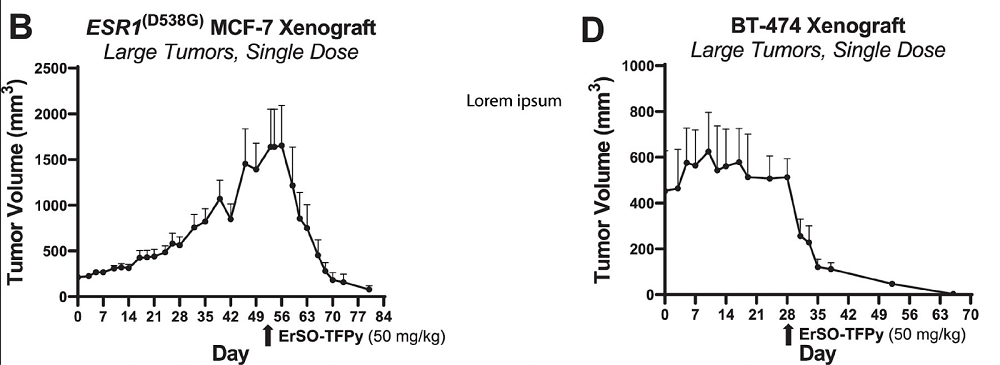Researchers have discovered a small molecule that effectively kills cancer cells in the most prevalent type of breast cancer. The new drug could help against cancer recurrence and decrease the need for surgery [1].
The ongoing fight against breast cancer
Medicine has made great strides in treating breast cancer, but the fight is far from over. About 70% of all cases are estrogen receptor alpha positive (ERα+), meaning that cancer cells express ERα, and tumor growth is driven by the hormone estrogen.
Current therapies already ensure a high five-year survival rate for ERα+ cancer patients. However, it hinges on early detection, surgical resection, and consequent long-term hormone therapy that in itself can cause serious side effects, including increased risk of endometrial cancer and osteoporosis [2]. Moreover, there is a high chance of recurrence: 10%-50% over 20 years, depending on the initial tumor size. When this happens, the resurrected cancer often does not respond to endocrine therapy due to mutations in ERα or other mechanisms.
In this case, there is an unmet need for treatments that would eliminate the cancer completely, preferably in a single swoop. A new study coming from the University of Illinois at Urbana-Champaign features a worthy candidate.
The researchers have been working on small molecules for treating ERα+ breast cancer for several years. Resistance in this type of cancer “occurs partly because endocrine therapies typically are cytostatic: tumor cell proliferation is inhibited, but cell death is modest,” the paper says. Hence, the researchers were looking for a drug that would kill breast cancer cells instead of just preventing their division.
The group’s previous candidate, ErSO, was effective, but it harmed ERα-negative cells as well [3]. This time, the researchers described an improved formulation: ErSO-TFPy. In previous studies, it showed high potency at low concentrations and tolerability at high concentrations. ErSO-TFPy targets the protein TRPM4, which is involved in cation transport and is upregulated in some cancers, including breast cancer.
First, the researchers tested ErSO-TFPy versus a string of current state-of-the-art treatments in several ERα+ breast cancer lines. The current drugs were less effective and, as expected, mostly cytostatic, causing the cells to stop dividing, while ErSO-TFPy effectively induced cell death.
Similar results were demonstrated in vivo: while fulvestrant, a currently used drug that served as a positive control, was only able to halt tumor growth, ErSO-TFPy achieved full tumor regression in concentrations well within the therapeutic window.
One of the models used was a xenograft derived from a patient who had developed drug-resistant cancer due to a mutation in ESR1, the gene coding for ERα+. In this setting, fulvestrant proved mostly ineffective, while ErSO-TFPy again eliminated the tumor completely.
In these experiments, the drug was given weekly as an intravenous injection. “This quantitative tumor regression is highly unusual for single-agent breast cancer therapeutics and may be the result of the unique, necrotic mechanism of action for this class of small molecules,” the paper says.
A single dose – even for large tumors
Given the surprising efficacy of the weekly regimen, the researchers wanted to see whether a single dose of their drug would do the trick – and it did. “If recapitulated in humans, such a minimal dosing regimen would revolutionize ERα+ breast cancer therapeutic management through improved treatment compliance, quality-of-life, and long-term outcomes for breast cancer patients,” the authors note.
“It is very rare for a compound to shrink tumors in mouse models of breast cancer, let alone completely eradicate those tumors with a single dose, so we are eager for ErSO-TFPy to advance for treatment of breast cancer,” said Paul Hergenrother, Kenneth L. Rinehart Jr. Endowed Chair in Natural Products Chemistry and the leading author of the study.
The efficacy of the current treatments for ERα+, as well as the chance of recurrence, is highly dependent on the stage at which the disease was diagnosed, so the researchers tested their drug in the extreme conditions of well-developed, extra-large tumors. Even in this challenging setting, a single IV dose of ErSO-TFPy (albeit at a higher concentration) was enough to shrink the tumors by more than 80%. This indicates the exciting possibility of a drug that can tackle late-stage breast cancer.

Interestingly, ErSO-TFPy gets washed out of circulation quickly. The researchers were pleasantly surprised and somewhat baffled by the prolonged effect of their drug and are looking for possible explanations.
“The ability of ErSO-TFPy to induce complete regressions after a single dose is surprising given ErSO-TFPy serum levels peak within 10 min of administration in mice and are undetectable after 16 h when dosed at 15 mg/kg IV,” the paper says. “The xenograft experiments show that tumor regression occurs over a period of weeks, long after the compound is eliminated.”
Literature
[1] Mulligan, M. P., Boudreau, M. W., Bouwens, B. A., Lee, Y., Carrell, H. W., Zhu, J., Mousses, S., Shapiro, D. J., Nelson, E. R., Fan, T. M., & Hergenrother, P. J. (2025). Single dose of a small molecule leads to complete regressions of large breast tumors in mice. ACS Central Science. Advance online publication.
[2] Goss, P. E., Ingle, J. N., Martino, S., Robert, N. J., Muss, H. B., Piccart, M. J., … & Pater, J. L. (2005). Randomized trial of letrozole following tamoxifen as extended adjuvant therapy in receptor-positive breast cancer: updated findings from NCIC CTG MA. 17. Journal of the National Cancer Institute, 97(17), 1262-1271.
[3] Boudreau, M. W., Mulligan, M. P., Shapiro, D. J., Fan, T. M., & Hergenrother, P. J. (2022). Activators of the anticipatory unfolded protein response with enhanced selectivity for estrogen receptor positive breast cancer. Journal of medicinal chemistry, 65(5), 3894-3912.
View the article at lifespan.io








































